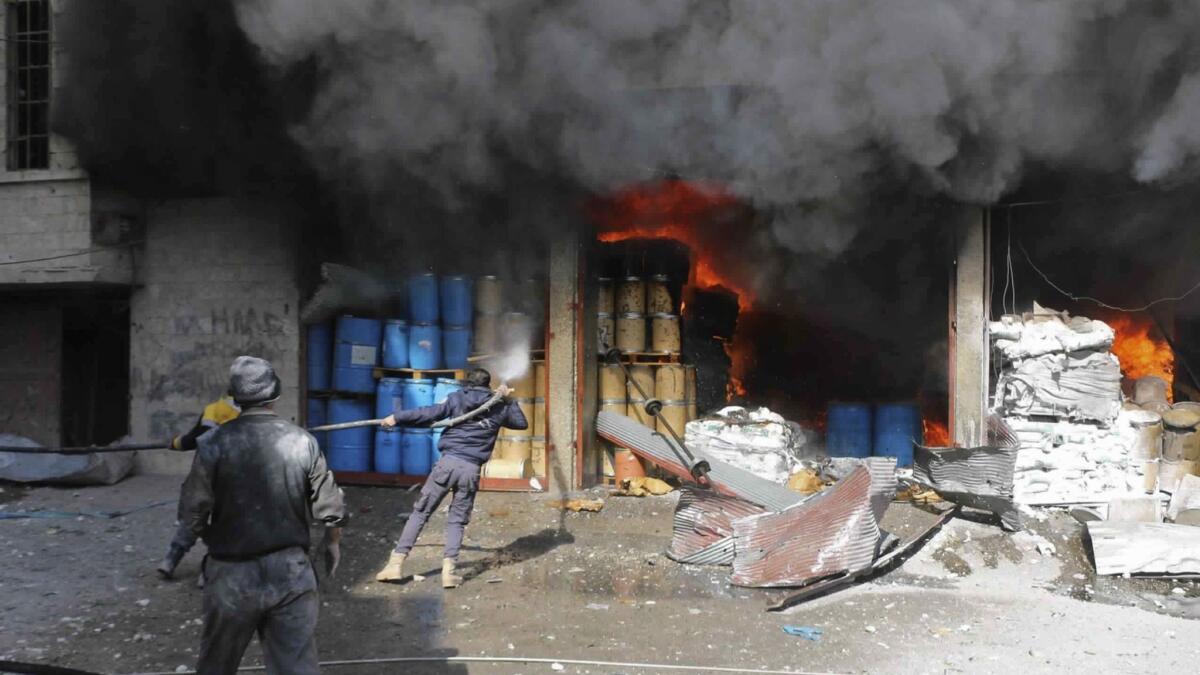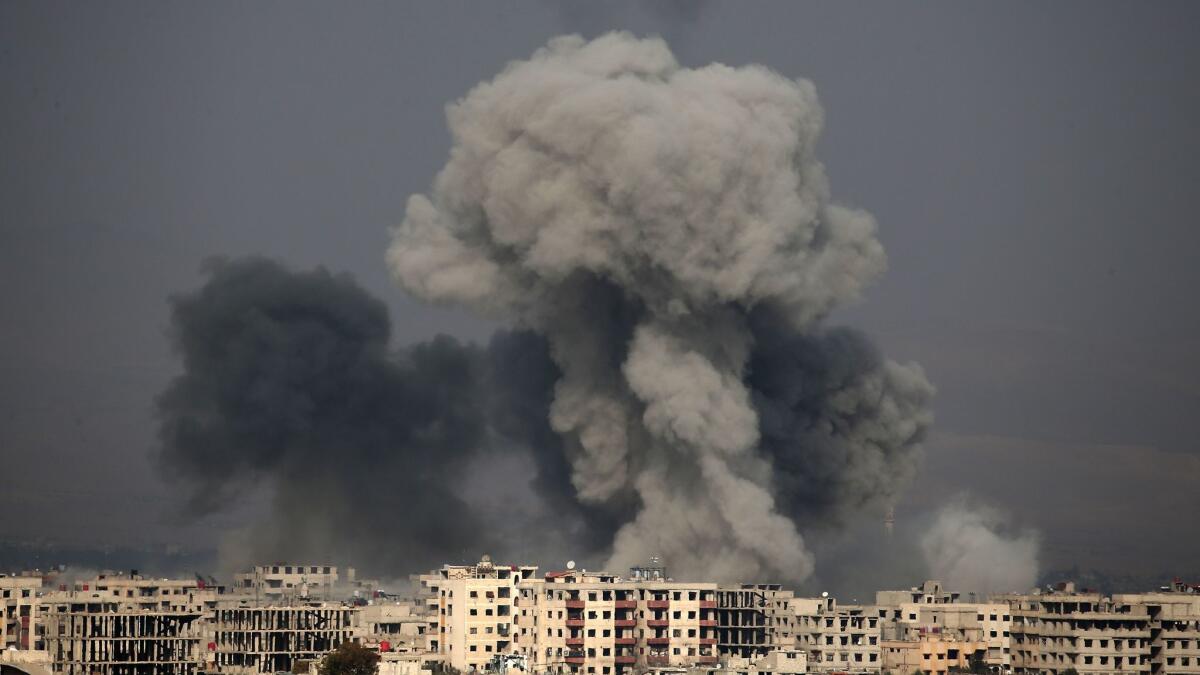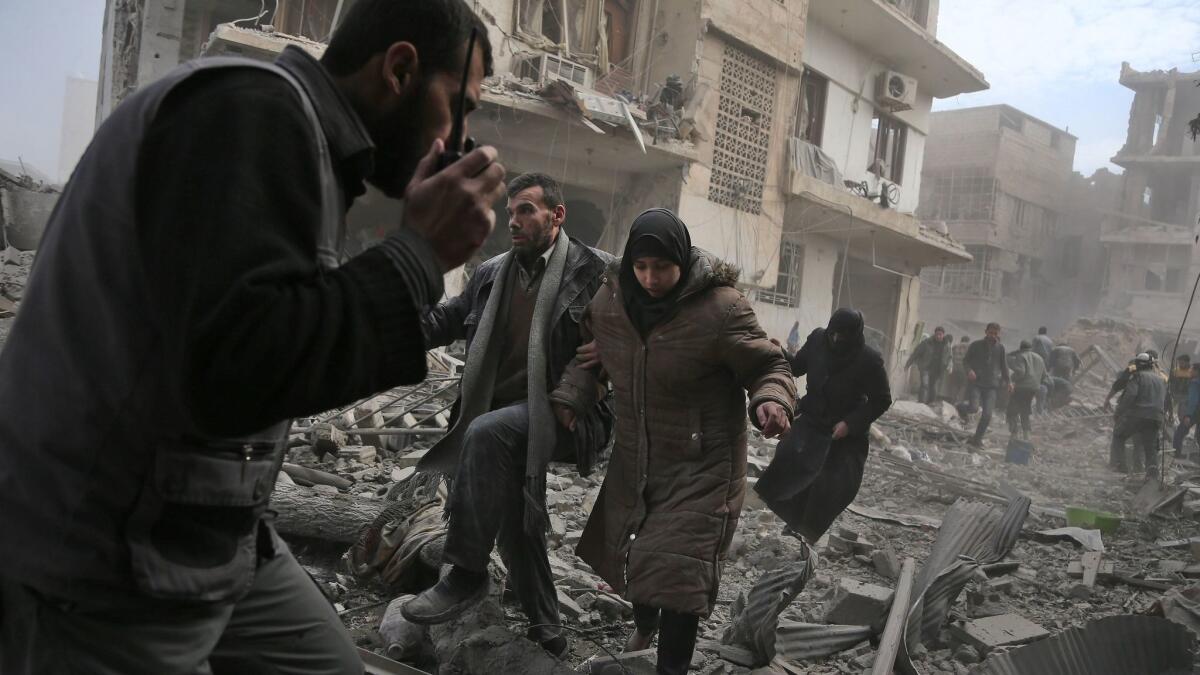‘It’s a catastrophe’: Almost 200 killed in multi-day bombardment of Syrian suburb

- Share via
Reporting from BEIRUT — A rebel-held suburb just outside Damascus, the Syrian capital, witnessed some of the deadliest fighting in the country’s long-running civil war Tuesday, even as the United Nations issued a plea to end the “senseless human suffering” in the enclave.
The bombardment, believed to be a prelude to a large-scale assault aimed at routing the rebels from east Ghouta, left at least 194 people dead and hundreds more wounded over 48 hours, activists said. The uptick in violence comes as the government of President Bashar Assad presses its advantage and tries to reassert control over all of Syria.
Ghouta, immediately east of the capital, is one of the opposition’s last remaining bastions in the country. The U.N. estimates that it is home to 393,000 residents.
The Syrian Observatory for Human Rights, a United Kingdom-based watchdog that relies on a network of activists in Syria, reported that 144 people had been killed Monday, while a fresh round of violence Tuesday left 50 more dead.

That would make it the highest death toll since a suspected sarin gas attack struck east Ghouta in 2015, killing hundreds. That attack brought the U.S. to within a hair’s breadth of deploying cruise missiles against the seat of power in Damascus.
Ghouta residents described an apocalyptic scene, with at least a dozen towns in the suburban region struck by a lethal combination of artillery, mortars and airstrikes “that hasn’t stopped for two days,” said Abu Khaled, a 30-year-old former teacher who was hiding in a basement with members of his extended family, in a video interview via the WhatsApp messaging service.
“The Ghouta has never witnessed such an escalation. Before you had bombs and strikes, sure, but it wasn’t this hysterical targeting we’re seeing now,” said Abu Khaled, adding that most of the people hiding in the basement with him had not been able to leave for three days.
His camera showed a grungy space, with a rock-strewn dirt floor and no bathroom, where Abu Khaled and 34 other people, mostly women and children, had taken shelter. The sounds of the ferocious barrage could be heard in the background.
“You just sit in the basement and you feel like it’s going to collapse on your head at any minute,” said Abu Khaled.
Siraj Mahmoud, a spokesman for Syrian civil defense volunteers, a team of first responders known as the “White Helmets,” said the bombardment of civilian areas had been relentless.
“Warplanes are attacking schools, markets, with all types of weapons ... and it’s methodical. It’s a catastrophe,” he said in a phone interview Tuesday.
Tuesday’s victims, Mahmoud continued, included one of their own: a first responder named Firas Jumaa, who was in what the group called a “double tap” attack in the town of Beit Sawa. (In a double tap strike, a second attack hits the same target after people and first responders have gathered to help victims of the first attack.)
Mahmoud said the death toll was likely to rise significantly because of a severe shortage of medicine. Medical centers were also targeted by the strikes, with at least five hospitals rendered inoperative, according to activists. The U.N. confirmed several had been hit.
“There are no safe areas whatsoever in eastern Ghouta,” said Mahmoud.
Horrific videos and images ricocheted through social media. Some depicted rows of corpses wrapped in ceremonial white shrouds; others showed first responders and panicked residents running through a fog of dust as they search for survivors among the rubble. One video shows the scene inside a basement, with a chorus of frightened women and children shouting when the camera begins to shake from the effects of a bomb.

Pro-government activists also took to social media to show the massing of troops for the impending ground incursion that Watan, a pro-government Syrian daily, said would happen sometime next week while reinforcements arrived from all over the country.
The army’s 3rd and 4th divisions, the Republican Guard, Russian forces, tribal fighters and pro-government irregulars are expected to take part in the offensive, pro-government activists said.
It will also include the Tiger Forces, an elite government unit whose commander, Gen. Suhail Hassan, released a video this week vowing to bring the fight to the rebels in Ghouta.
“I promise you I’m the one who will teach them a lesson in combat and fire,” said Hassan. “And if I light the fire, then I say to them, await its hell…. You will see it with your own eyes.”
Many in Damascus welcomed the campaign on Ghouta. Rebel units have long peppered Damascus’ center with mortar and rocket fire. The state-run Syrian Arab News Agency reported five people were killed and 20 others wounded in militant shelling of residential neighborhoods in the capital.
“These terrorist attacks come at a time when some Western officials and others are conducting a campaign that can only be described as direct support to those terrorists,” said the Syrian Foreign Ministry in a letter to the U.N., employing Damascus’ customary description for the opposition.
The U.N.’s Panos Moumtzis, the regional humanitarian coordinator for the Syrian crisis, said in a statement Monday that the humanitarian situation in Ghouta, already made dire by a years-long siege, was “spiraling out of control.”
Malnutrition rates had reached unprecedented levels, while an acute shortage of flour had pushed bread prices to 22 times the national average, said Moumtzis.
“It’s imperative to end this senseless human suffering now. Such targeting of innocent civilians and infrastructure must stop now,” he said.
Linda Tom, a Damascus-based spokeswoman for the U.N.’s Office for the Coordination of Humanitarian Affairs, said in a phone interview Tuesday that things “have always been bad in eastern Ghouta… but the last couple of hours have been particularly bad.”
Although the U.N. had been able to deliver a shipment of aid on Wednesday, there had been no other, despite the government having approved nine such convoys to besieged areas until the end of the month.
And the one convoy that went to Ghouta, delivering assistance to some 7,200 people, was “nowhere close to meeting the needs of almost 400,000 people,” Tom said.
The calls to allow access were echoed by other humanitarian groups, including the International Rescue Committee and Save the Children.
All released statements calling for an immediate halt to the violence while warning that east Ghouta could become another east Aleppo, the former rebel bastion that at one time encompassed more than half of that northern Syrian city.
Beyond Aleppo’s bustling market, the cost of Syria’s brutal civil war becomes clear »
Pro-government forces took it back in December 2016 after a similar Russian-backed offensive subdued the rebels. They agreed to an evacuation deal giving them passage to the northwestern province of Idlib. Pro-government forces are now waging battles in Idlib, as well as in the south and eastern corners of the country.
Russian Foreign Minister Sergei Lavrov also saw another Aleppo scenario in Ghouta, but not as a potential humanitarian catastrophe. In a statement from Moscow reported by the Russian state news agency Tass on Monday, he said he considered it as a model that would serve to broker a similar “organized exodus” with militants.
Shrugging off the warnings, Lavrov countered that the militants in Ghouta were controlled by the former Al Nusra Front, the Al Qaeda-affiliated rebel faction now known as the Organization for the Liberation of Syria.
“We find it very worrisome,” he said, “that in fact only the Syrian army and the Russian aerospace group that supports it are trying to suppress this terrorist wing of Al Qaeda and those collaborating with it.”
ALSO
Tangled fight in Syria poses new dangers to U.S.
U.S. pledges aid increase to Jordan, hints at developments in Middle East peace process
Russia’s shadowy world of military contractors: independent mercenaries, or working for the Kremlin?
Bulos is a special correspondent.
UPDATES:
1:05 p.m.: This article has been updated throughout with Times reporting.
This article was originally posted at 5:40 a.m.
More to Read
Sign up for Essential California
The most important California stories and recommendations in your inbox every morning.
You may occasionally receive promotional content from the Los Angeles Times.











